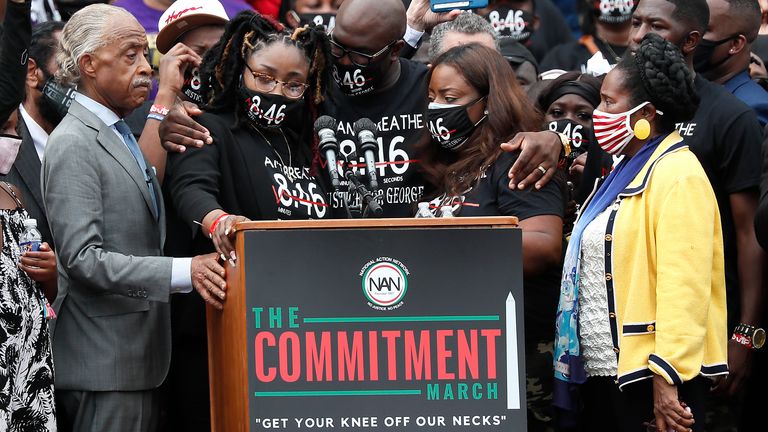‘Get your knee off our necks’: Struggle for justice continues 57 years after famous speech
There’s an engraving on the steps of the Lincoln Memorial commemorating Dr Martin Luther King’s “I have a dream” speech in 1963.
It’s difficult to spot on the white marble and so, periodically, someone uses water to darken and define the inscription.
It’s the re-anointment of the civil rights icon and his “coalition of conscience” that steered America towards change.
Fifty-seven years later, on the spot where his father stood, Dr King’s son, Martin Luther King III, told a modern-day crowd they were still involved in a struggle for justice and his father’s dream had become an “American nightmare of racist violence”.
A supporting cast of human evidence strengthened the message. The event’s speakers included the mothers, fathers, sisters and brothers of Breonna Taylor, Jacob Blake, George Floyd and others.
They are, tragically, household names. In many cases, America has watched their deaths at the hands of police officers play out on mobile phone footage.
Their names were chanted and banners bore their images alongside slogans such as “No justice, no peace” and “We will not support your system of genocidal oppression”.
The bereaved relatives brought a raw and unvarnished sense of loss and injustice to this march, entitled: “Get your knee off our necks”, after the method by which George Floyd was killed during arrest.
Mr Floyd’s sister, Bridgett Floyd, told the crowd: “My brother cannot be a voice today. We have to be that voice, we have to be the change and we have to be his legacy.
“What will be your legacy? Will your future generations remember you for your complacency, your inaction, or will they remember your leadership, empathy, your passion.”
This peaceful gathering gave a strong echo of events 57 years ago. The modern-day movement is propelled by recent events in its determination to re-calibrate race relations in America.
The issue is central to the corrosive election debate, so too civil rights, racial injustice and economic opportunity.
Source: Read Full Article




